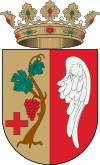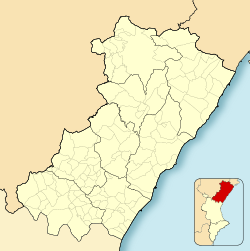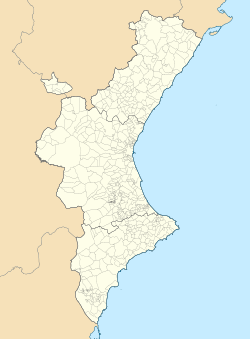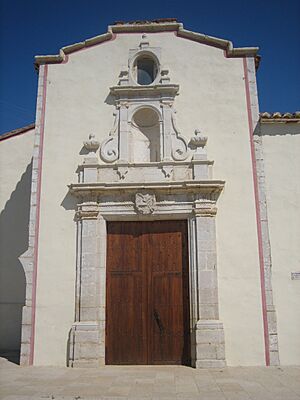Vinaròs facts for kids
Quick facts for kids
Vinaròs
Vinaroz
|
|||
|---|---|---|---|
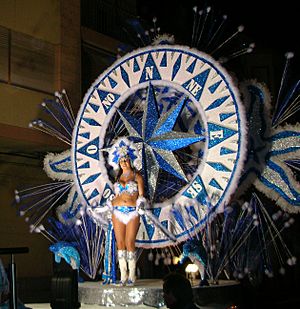
Carnival in Vinaròs.
|
|||
|
|||
| Country | |||
| Autonomous community | |||
| Province | Castellón | ||
| Region | Baix Maestrat | ||
| Area | |||
| • Total | 95.46 km2 (36.86 sq mi) | ||
| Elevation | 7 m (23 ft) | ||
| Population
(2018)
|
|||
| • Total | 28,438 | ||
| • Density | 297.905/km2 (771.57/sq mi) | ||
| Demonym(s) | Vinarossenc | ||
| Time zone | UTC+1 (CET) | ||
| • Summer (DST) | UTC+2 (CEST) | ||
| Official language(s) | Valencian and Spanish | ||
Vinaròs (Valencian pronunciation: [vinaˈɾɔs]) (Spanish: Vinaroz) is a lively city located in eastern Spain. It's the main town of the Baix Maestrat area, found in the province of Castellón. Vinaròs sits right on the border between two important regions: the Valencian Community and Catalonia. It's well-known as a busy fishing port and a popular spot for tourists.
Contents
History of Vinaròs
The first time Vinaròs was mentioned in history was in 1233. Back then, it was a small village called Binarlaros-Ibn Arus. This village was part of al-Andaluz, an area ruled by the Moors, who were people from North Africa. King James I of Aragon captured the village in 1233.
After that, Vinaròs was ruled by different groups. From 1294 to 1311, it was controlled by the Knights Templar, a famous group of warrior monks. Later, in the 14th century, it was governed by the Order of Montesa.
The town grew a lot during the 16th and 17th centuries. People built strong walls and places to build ships. Vinaròs became very rich in the 18th and 19th centuries. This was because it was involved in building ships and trading Valencian wine.
However, in the early 1900s, Vinaròs faced a big problem. A plant disease called phylloxera destroyed many vineyards. This caused the wine business to suffer greatly.
Today, Vinaròs is doing well again. Its success comes from tourism and fishing. The city is especially famous for its delicious prawns. Vinaròs is also part of the Taula del Sénia, a group of towns that work together.
Main Sights in Vinaròs
One of the most important buildings in Vinaròs is the Església Arxiprestal de l'Assumpció. This is the Archpriestal Church of the Assumption of Our Lady. It looks a bit like a fortress!
The church was built between 1583 and 1596. It was designed in the Renaissance style, which was popular at that time. Later, from 1698 to 1702, a new entrance was added. This new entrance is in the Baroque style, which is very decorative.
Culture
Carnival of Vinaròs
The Carnival of Vinaròs is a very exciting event. It usually happens in January, February, or March. Many people take part in it. There are 33 different groups, called "troupes." Some troupes have as many as 550 members! Each troupe chooses a queen, and she wears an amazing, spectacular costume.
Carnival Calendar
The Carnival lasts for several days, full of fun activities:
- Day 1 (Friday): The Carnival officially begins at the Town Hall. There's a special show that matches the Carnival's theme. For example, in 2017, the theme was "Bollywood." A large wooden man called "Carnestoltes" is introduced. He also wears a costume that fits the theme. After this, the Mayor and the queens open the Carnival's party area. This area is called the Fóra Forat Walk. Here, each troupe has its own hut, and everyone can enjoy parties every night.
- Day 2 (Saturday): This is the Queen's Presentation. The queens show off their incredible costumes for the first time. No one knows what their costumes look like until this day! This event takes place at the old football pitch.
- Day 3 (Sunday): Get ready for some messy fun! There's a Flour's Battle where people throw flour at each other. There's also a Disguised Pets Competition. Both events happen at the Fóra Forat Walk.
- Day 4 (Monday): A special dinner is held for the elderly people of Vinaròs.
- Day 5 (Tuesday): Some of the troupes compete in a Karaoke Song Contest. It's a chance to show off their singing skills!
- Day 6 (Wednesday): People dress up in costumes that match the Carnival's theme. They enjoy a fun night at the Carnival's party area.
- Day 7 (Thursday): Everyone wears their pajamas for a relaxed night at the Fóra Forat Walk.
- Day 8 (Friday): People wear all sorts of costumes. Some even design and make their own amazing outfits! They enjoy another night of parties at the Fóra Forat Walk.
- Day 9 (Saturday) and Day 10 (Sunday): These are the biggest days! The troupes parade through the main streets of Vinaròs. On Saturday, the parade starts at 7 p.m. On Sunday, it starts at 6 p.m. The parade route goes through streets like Calle Pilar, Calle Pablo Ruiz Picasso, and Avenida País Valencià.
- Day 11 (Monday): The Carnival comes to an end. The "Carnestoltes" wooden man is burned. This happens either on the beach or in an open field.
There's also a Summer Carnival in August. During this time, the Queen's Presentation is held again. This is a great way to show tourists what the Carnival in Vinaròs is like.
Famous People from Vinaròs
Vinaròs has been home to several interesting people:
- Louis Joseph, Duke of Vendôme (1654 - 1712): He was a military leader during the War of the Spanish Succession. He fought for the Bourbons. Sadly, he passed away in Vinaròs after eating too many king prawns.
- Vicent Guilló Barceló (1647 - 1698): Born in Vinaròs, he became a famous Baroque painter.
- Maria Conesa (born in Vinaròs, 1890s - died in Mexico, 1970s): She was a well-known actress in Mexico. People often called her "la gatita blanca," which means "the white kitten."
- Carles Santos Ventura (born 1940): He is a talented artist who does many things. He is a pianist, a composer (someone who writes music), a painter, a sculptor, and a performer.
- Leopoldo Querol: He was a skilled pianist and a professor at the National Conservatory of Music.
- Joan Elies Adell i Pitarch: He is a poet, known for his beautiful writing.
- José María Salaverría: He was a writer.
See also
 In Spanish: Vinaroz para niños
In Spanish: Vinaroz para niños
 | Misty Copeland |
 | Raven Wilkinson |
 | Debra Austin |
 | Aesha Ash |



